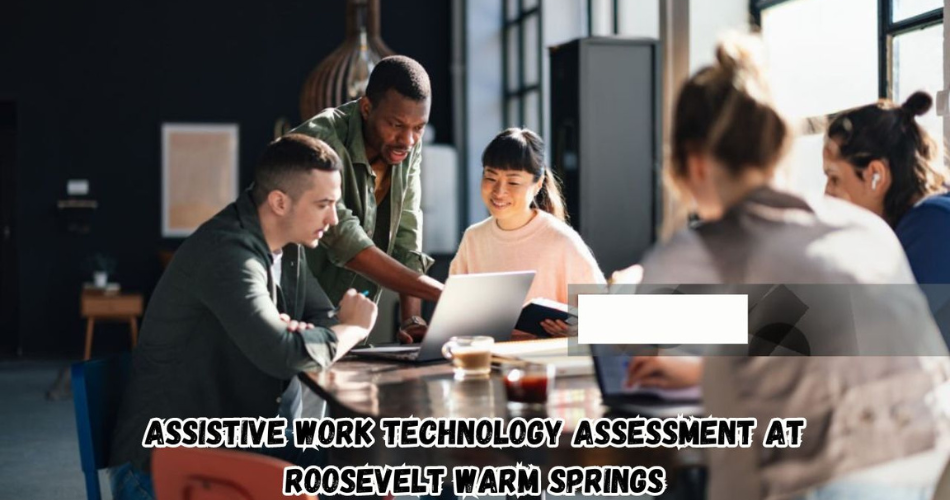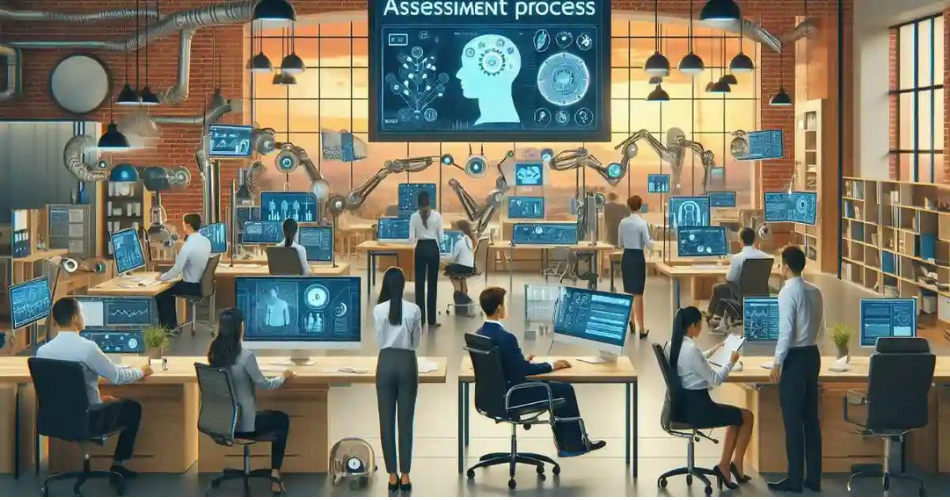Introduction
Roosevelt Warm Springs (RWS), established by President Franklin D. Roosevelt, stands as a hallmark of commitment to vocational rehabilitation. This esteemed center remains an essential resource for individuals aiming to improve their workplace functionality and independence. A key component of RWS’s mission is its comprehensive assistive work technology assessment at roosevelt warm springs. This process is instrumental in tailoring the right tools to each client’s unique needs, ensuring they can perform job tasks efficiently and autonomously. The assessment is both detailed and individualized, providing the necessary support for each person to achieve their professional goals effectively.
Personalized Assessment Approach at Roosevelt Warm Springs
At Roosevelt Warm Springs (RWS), the emphasis on personalization is central to their assistive work technology assessment at roosevelt warm springss. Understanding that each individual has distinct needs, RWS employs a thorough and individualized evaluation process. This process starts with an in-depth assessment of the client’s physical capabilities, cognitive functions, and sensory requirements. By considering every facet of the client’s abilities—from physical tasks to cognitive and sensory processing—RWS ensures a holistic understanding of their needs.
The assessment process involves a collaborative effort among experts from various disciplines. Occupational therapists, physical therapists, and vocational rehabilitation specialists work in concert to evaluate the client’s job requirements and personal challenges. This multidisciplinary approach guarantees that every element of the client’s work environment is addressed, resulting in a tailored and effective solution.
Innovative Assistive Devices and Solutions
Roosevelt Warm Springs is renowned for incorporating advanced technology in their assistive work technology assessment at roosevelt warm springs at roosevelt warm springs. Their selection of assistive devices is extensive and continuously updated to reflect the latest technological advancements. RWS provides an array of tools aimed at improving workplace productivity and accessibility.
For clients with mobility challenges, adaptive seating solutions and specialized computer equipment are essential. These devices are designed to enhance usability and comfort, featuring ergonomic workstations and voice-activated software to minimize physical strain.
For individuals with visual impairments, RWS offers critical assistive technologies, including screen readers and magnification software. These tools facilitate full participation in professional settings by improving access to and interaction with visual content.
Collaborative Multidisciplinary Team Approach
The success of Roosevelt Warm Springs’ assistive work technology assessment at roosevelt warm springss can be largely attributed to its inclusive and multidisciplinary approach. This method involves a collaborative effort among a diverse group of professionals, each specializing in different aspects of assistive technology. The team comprises physical therapists, occupational therapists, speech-language pathologists, and audiologists, all working together to meet the unique needs of each client.
Physical Therapists: These specialists play a crucial role in ensuring that assistive devices are aligned with the client’s body mechanics. Their expertise helps in selecting and adjusting devices that enhance physical functionality and reduce discomfort.
Occupational Therapists: They focus on how the technology will be integrated into real-world work settings. By evaluating the practical application of assistive devices, occupational therapists ensure that clients can perform their job tasks efficiently and comfortably.
Speech-Language Pathologists: For clients with speech impairments, these professionals assess and recommend communication tools that facilitate effective interaction in the workplace.
Audiologists: They evaluate hearing assistive technologies to ensure that clients with hearing impairments have access to appropriate and effective tools, improving their auditory experience in the work environment.
This comprehensive team approach at Roosevelt Warm Springs ensures that every aspect of an individual’s work environment is optimized, promoting their success and well-being.
Ergonomic Workstation Design and Customization
A pivotal aspect of Roosevelt Warm Springs’ assistive work technology assessment at roosevelt warm springs is its focus on ergonomics. Properly designed workstations are essential for preventing the exacerbation of physical challenges and avoiding the introduction of new issues.
The ergonomic assessments conducted by RWS’s team involve a detailed evaluation of workstations to ensure they support optimal posture, minimize strain, and enhance overall comfort. Key components include:
Adjustable Desks: These desks allow for height adjustments to accommodate different working positions, whether sitting or standing.
Specialized Chairs: Ergonomically designed chairs provide necessary lumbar support and adjustability to prevent strain and promote proper posture.
Keyboard Trays: These trays help in positioning keyboards at an optimal height and angle, reducing strain on the wrists and arms.
By tailoring these ergonomic solutions to individual needs, Roosevelt Warm Springs helps clients maintain both comfort and productivity throughout their workday.
Adaptations for Cognitive Impairments
Roosevelt Warm Springs’ assistive work technology assessment at roosevelt warm springs also addresses cognitive impairments by integrating tools and adaptations that support cognitive function. For individuals dealing with traumatic brain injuries, learning disabilities, or other cognitive challenges, RWS implements a variety of solutions:
Memory Aids: Tools designed to assist with memory retention and recall, helping clients manage daily tasks more effectively.
Organizational Software: Software solutions that aid in task management and organization, streamlining work processes and reducing cognitive overload.
Adaptive Learning Programs: Programs tailored to support learning and task completion, accommodating different cognitive needs and improving overall efficiency.
By incorporating these cognitive adaptations into the workplace, Roosevelt Warm Springs ensures that individuals with cognitive impairments can excel in their work environments, achieving their full potential despite their challenges.
Speech and Communication Aids
At Roosevelt Warm Springs (RWS), the assistive work technology assessment at roosevelt warm springs is designed to support individuals with speech impairments by providing specialized speech and communication devices. This includes evaluating the need for speech-generating devices and various augmentative and alternative communication (AAC) tools.
These technologies enable individuals to convey their thoughts and interact with colleagues and supervisors more effectively. By addressing communication barriers, RWS empowers clients to engage more actively and confidently in their professional roles.
Hearing Assistive Technologies
These technologies are crucial for improving the ability to hear and respond to conversations, alarms, and other essential sounds in the workplace.The RWS team also provides training on the use and maintenance of these hearing aids, ensuring clients can maximize their effectiveness and achieve long-term success. This support is essential for clients to adapt to their hearing technologies and fully participate in their work environments.
Customized Mobility Solutions
Mobility challenges can significantly affect an individual’s ability to navigate their workplace. Roosevelt Warm Springs specializes in tailoring mobility solutions to meet these needs, including providing customized wheelchairs, scooters, and other mobility aids.
Additionally, RWS assesses and recommends structural modifications, such as ramps and elevators, to ensure a fully accessible workplace. By offering these personalized solutions, RWS helps clients move with ease and confidence in their professional settings.
Adaptive Software for Visual Impairments: Enhancing Accessibility and Inclusivity
Individuals with visual impairments greatly benefit from specialized adaptive software designed to improve their ability to perform various tasks. Roosevelt Warm Springs (RWS) stands out in providing comprehensive assistive work technology assessment at roosevelt warm springss, offering a range of solutions including screen readers, magnification tools, and speech-to-text programs. These advanced tools are crucial for fostering an inclusive work environment that accommodates employees with varying levels of visual ability.
Key Features of Adaptive Software
Screen Readers: These programs convert text displayed on a screen into spoken words, allowing individuals who are blind or have severe visual impairments to access written content effortlessly. By vocalizing the text, screen readers enable users to navigate websites, documents, and other digital platforms with greater ease.
Magnification Tools: Designed for individuals with partial vision, magnification software enlarges text and images on a screen, making visual content more accessible. These tools are customizable, allowing users to adjust the magnification level according to their specific needs.
Speech-to-Text Programs: These programs convert spoken words into written text, facilitating easier documentation and communication. Speech-to-text technology is particularly beneficial for individuals who find typing challenging due to visual impairments.
Integrating these adaptive software solutions is essential for creating a work environment that is truly inclusive, ensuring that every individual can access and interact with visual information effectively.
Comprehensive Training and Continuous Support
At Roosevelt Warm Springs, the provision of adaptive technology is complemented by extensive training and ongoing support. The assistive work technology assessment at roosevelt warm springs includes personalized training sessions where clients learn to use their new devices and software proficiently. This training is crucial for helping individuals feel comfortable with the technology and incorporate it into their daily work routines seamlessly.
Furthermore, RWS offers continuous support to address any adjustments or technical issues that may arise. This ongoing assistance is pivotal in ensuring that clients can maintain their independence and achieve long-term success in their professional environments.
Case Study: Empowering Sarah with Mobility Challenges
A notable example of RWS’s impact is the case of Sarah, a 35-year-old woman who experienced a spinal cord injury. Seeking support from RWS, Sarah received a customized wheelchair and adaptive seating, which were instrumental in her return to her job as a software developer.
Ergonomic Workstation: Sarah’s workstation was tailored to her needs, featuring a motorized desk that could be adjusted for various activities. This customization reduced physical strain and allowed Sarah to work comfortably for extended periods.
Voice-Activated Software: To further ease her workload, Sarah was provided with voice-activated software. This technology minimized the physical effort required for typing, thus enhancing her efficiency and effectiveness in completing her tasks.
Conclusion
Roosevelt Warm Springs (RWS) is at the forefront of enhancing workplace accessibility and empowering individuals with disabilities through its specialized assistive work technology assessment at roosevelt warm springss. By offering tailored evaluations, integrating cutting-edge technology, and providing continuous support, RWS helps clients achieve greater independence and success in their careers. This holistic approach ensures that each individual receives the most appropriate tools and assistance to address their unique challenges. Roosevelt Warm Springs’ unwavering commitment to meeting diverse client needs solidifies its reputation as a leader in the field of vocational rehabilitation and assistive technology.
Keep up-to-date with breaking news and updates on Newslinktimes
